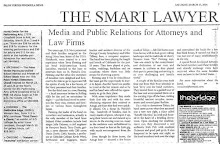The attorney was annoyed. Her firm had won a hard-fought verdict but their celebration was muted by what they considered improper media coverage.
"All they talked about was the size of the verdict," she stated with no little disgust. "They missed the policy issue and the misconduct of the other side. They ignored the bigger picture and the need for a Legislative solution. And they made us sound like we were gloating about winning"
I expressed my sympathy and made a few suggestions for follow-up media on the underlying issues. "By the way," I asked, "can you send over a copy of the news release you issued?"
She sent over an email with the release. The headline read, "$6.5 million verdict in [detail redacted] case."
I read further down. No mention of the policy issue. No mention of the alleged misconduct. No mention of the need for a Legislative solution. No big picture.
The release never even mentioned under what cause of action and legal theory the other party was responsible for damages. What had the other party done wrong, for goodness sake? Breach of contract? Defective product? Copyright infringement? Nothing there.
[The damages alleged by the plaintiff led me to make a private guess as to the cause of action, but nowhere was that fact stated.]
Next, a Google news search for the media hits.
Three separate people from the firm were quoted that I could find. All had different messages. One thing in common: None of the quotes from any of those quoted covered policy, misconduct, Legislative reform or big picture.
What they did mention: The size of the verdict [6 times]; How deserving they were, and their clients were, for the 'win' [5 times]; How hard they worked to get the verdict [3 times]; How awful and egregious and truly heartrending were the damages suffered by the client [3 times].
I called the attorney back and explained what I found. Her response: "Well, aren't the reporters supposed to find out all that other stuff?"
The painfully obvious answer is: "No."
You are an attorney, a legal expert. Moreover you are the attorney who handled the case.
If you cannot be bothered to translate the unfathomable gobbledygook [to a lay person] of a hard-fought litigation into three to five talking points that a journalist and the lay public can understand, who is going to do that?
No one.
A bare-bones "how to" of building a story in the media:
--Designate one person to talk to the media.
--Take the time to craft three to five talking pointsthat sum up your message. --
--Stick to those talking points.
If your message is "unjust system" then you need to say that [and support it with evidence, counselor]. If you allege misconduct then say misconduct. If your stance is that the situation that resulted in a wrongdoing or injury, and protracted litigation, is such that it merits Legislative action, say so.
If you say, "big verdict," "we won," and "we deserve the money," don't be shocked if that is exactly what you read in the paper or see on TV tonight.
If you fail to do your part then you can count on journalists to pick up on the most accessible facts [big verdict!], to dutifully repeat the points that you --the expert-- say are important [big verdict!] and to fall into predictable patterns of repeating stereotypes of litigation and the legal system [Look! Another great big verdict!!].
And whose fault is that, really?
Your reputation is your most valuable asset
Subscribe to:
Post Comments (Atom)







1 comment:
Well said but, gosh, a little preachy right?
Post a Comment